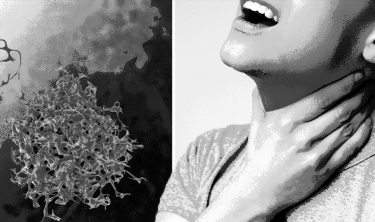Cancer symptoms: Top 14 early signs to look out for
We use your sign-up to provide content in ways you’ve consented to and to improve our understanding of you. This may include adverts from us and 3rd parties based on our understanding. You can unsubscribe at any time. More info
The emergence of cancer symptoms marks the beggining of a difficult journey that’s full of uncertainty. It is hard to pinpoint the moment cancer symptoms arrive because they often seep into your life over an extended perioud of time. This makes them easy to miss.
Improving awareness of the warning signs is vital because early detection leads to better outcomes.
Although some symptoms are unique, some are prevalent across different types of cancer, such as dyspnoea.
Dyspnoea, also known as shortness of breath, happens when you are not taking in enough oxygen and your lungs try to draw in more air to make up for it.
According to Cancer Research UK, between five and seven out of every 10 cancer patients (50 percent to 70 percent) have this symptom at some time during their illness.

“This figure rises to nine out of 10 (90 percent) for people who have advanced lung cancer.”
You are more likely to have breathing problems if you have:
- Lung cancer
- Mesothelioma
- Cancer that has spread to the lung.
“Being short of breath can be very uncomfortable and frightening. It can make you feel very anxious and panicky, which often makes it even harder to catch your breath,” explains Cancer Research UK.
According to charity, people with cancer can become breathless for many different reasons.
DON’T MISS
Cancer: Two types of pain associated with cancer [INSIGHT]
Dementia: ‘Commonly prescribed’ drug linked to decline [TIPS]
Pfizer vaccine: Two complications reported in document [ADVICE]
Once your doctor finds out the cause of your breathing problems there is usually a type of treatment that will help you.”
Other symptoms of cancer include:
- Fatigue
- Lump or area of thickening that can be felt under the skin
- Weight changes, including unintended loss or gain
- Skin changes, such as yellowing, darkening or redness of the skin, sores that won’t heal, or changes to existing moles
- Changes in bowel or bladder habits
- Persistent cough
- Difficulty swallowing
- Hoarseness
- Persistent indigestion or discomfort after eating
- Persistent, unexplained muscle or joint pain
- Persistent, unexplained fevers or night sweats
- Unexplained bleeding or bruising.
How to respond
It’s important to be aware of any new or worrying symptoms.
“Although it’s unlikely to be cancer, it’s important to speak to a GP so they can investigate. Finding cancer early means it’s easier to treat,” explains the NHS.

The health body continues: “If your GP suspects cancer, they’ll refer you to a specialist – usually within two weeks.”
How to reduce your risk
Making some simple changes to your lifestyle can significantly reduce your risk of developing cancer.
According to Macmillan Cancer Support, around one in three cases of the most common cancers (about 33 percent) could be prevented by eating a healthy diet, keeping to a healthy weight and being more active.
The charity explains: “Eating a balanced diet is good for your overall health and helps reduce your risk of some cancers. It can also help you to keep to a healthy weight.”

According to the health body, eating plenty of high-fibre foods helps reduce the risk of bowel cancer.
Red and processed meat have also been linked to a higher risk of bowel and prostate cancer in several studies.
Red meats include beef, pork, lamb and veal. Processed meats include sausages, bacon, salami, tinned meats, and packet meats like sandwich ham.
Many studies have found that regular physical activity can reduce the risk of cancer.
Source: Read Full Article
